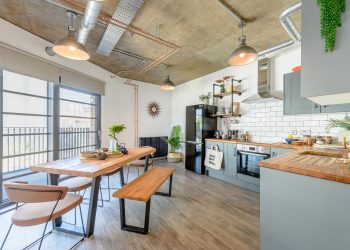It’s important to understand the different ways you can own your home. Freehold, leasehold, share of leasehold – all have a major impact on how you actually own your property. So, what is Share of Freehold? We look at the pros and cons of this type of homeownership and answer the most frequently asked questions on the topic.
FAQs
What does Share of Freehold mean?
If you buy a property with a Share of Freehold, this means you own your property leasehold plus a share of the freehold for the building your property is in and the land it’s on. This usually applies to apartments. So owners of the apartments in a building each own their apartment leasehold, as well as holding a share of the freehold for that entire building and the land it sits on.
It’s also important to understand leasehold and freehold homeownership before Share of Freehold will make sense:
Freehold
If you own a property freehold, you own it outright. This includes the land it’s on and the airspace above your property.
Leasehold
If you own a property leasehold, you hold a lease (usually lasting decades or centuries) for that property. You will have a contract with the landlord, or freeholder, to set out your legal rights and responsibilities.
Does share of freehold add value?
Gaining share of freehold could add value to your property if your lease is short (85 years or below). Joining with the other leaseholders in your apartment building to buy the freehold could be cheaper than extending the lease on your property.
Share of freehold could also add value to your property if you feel that the building will be better run as a result. A well-managed and maintained building can add value to every property within it.

How much does share of freehold add value?
It’s impossible to put a concrete value on having share of freehold. Every property is different, and it depends on many different factors. However, it is unlikely to add much to the property’s base value by itself.
However, having share of freehold can boost the desirability of the property. This is because it makes it easier to renew the lease, and the owner is less vulnerable to overcharging on ground rent and service charges. Additionally, having a say in how the freehold area is managed is attractive to many buyers.
Is share of freehold the same as leasehold?
If you gain a share of freehold for your building, you will still own your property on a long lease. However, as a co-owner of the freehold of the entire building, you and the other co-owners now have control over lease lengths.
This means that you can renew your lease and only pay for the legal fees. Previously you would have had to pay the freeholder as well in order to extend your lease. Once you have a share of the freehold, you and the other co-owners will control things like ground rent, building insurance, etc.
Is a 999 year lease a freehold?
No, a 999-year lease is not the same as a freehold, or even a share of freehold. Such a long lease protects you against the main issue of being a leasehold – the lease running out – but does not provide the benefits of owning the freehold.
Is share of freehold a good thing?
Gaining a share of the freehold generally allows leaseholders to have more control over their homes. It is a legal right to be able to take over the freehold, as long as you have at least half of the other residents willing to also do so.
Share of freehold can be a solution if you and the other leaseholders have issues with how your building is being run by the freeholder. It allows you to set the ground rent for the building, find the best building insurance and extend leases as you wish.

What are the main problems with share of freehold?
Share of freehold can be an expensive and complicated process. You need to have at least half of the property owners in the building willing to buy the freehold. You will all have to work together and agree on the system you will use to manage the building. Many people create a limited company for this purpose.
You must be able to afford the purchase price of the freehold, as well as the costs of a valuation survey and legal fees for the leaseholders and freeholder. Stamp duty land tax is also due if the purchase price is over £125,000.
Share of freehold lease extension
Once you have share of freehold, you are able to extend your lease for free – usually up to 999 years. This is only as long as the other co-owners of the freehold agree. You will also have to pay legal fees to extend your lease.
Can I sell share of freehold property?
You can sell your property with the share of freehold intact. However, the other share of freehold owners will need to agree to the buyer’s purchase. The buyer’s conveyancer should directly liaise with all the share of freeholders to get their permission and complete the necessary paperwork.
Read more
How do I transfer share of freehold?
If you own a share of freehold for your property, you will need a formal deed in order to transfer ownership. This deed will transfer ownership from yourself and the other co-owners of the freehold, over to the new owner of your property and all the other co-owners.
Can a freeholder refuse to sell the freehold?
As long as the leaseholders qualify for collective enfranchisement (taking on share of freehold), the freeholder cannot refuse to sell the freehold. It is illegal to refuse to sell.

Is share of freehold better than leasehold?
Share of leasehold is better than freehold if you are unhappy with how your building is being run. It can also be cheaper to renew leases on leasehold properties once you have control of the freehold. However, many leaseholders are happy to allow their landlords to run their building and pay the relevant fees for ground rent, service charges, etc.
Can flats be sold freehold?
Flats can be sold ‘freehold’, i.e.: the buyer owns the flat but not the land it is built on, or any of the communal areas of the building it fits into. ‘Freehold flats’ are basically the same as regular flats, except that they have no leasehold title.
While this sounds good in theory – no leasehold-related charges – there are issues with this arrangement. Most mortgage lenders will not offer mortgage deals on freehold flats. The issue here is the lack of a clear legal obligation or agreement when it comes to carrying out repairs to the wider building. Bear this in mind before entering into a freehold flat sales negotiation.

Can you rent out share of freehold?
You can rent out properties with a share of freehold. This can be done just like you would a normal freehold or leasehold property.
Do I still have to pay service charges?
You and the other leaseholders in your building will set the service charges and ground rent for your building. As there are usually costs associated with communal areas, lifts and other parts of the building used by all residents, you will still need to share out the service charge to those residents, including yourself.
Do you pay ground rent if you have share of freehold?
Unless it is otherwise stated in your share of freehold agreement, you will still have to pay ground rent and other fees associated with leasehold properties, such as service charges. This is because you are still living in the property on a leasehold basis.
On the plus side, leasehold residents with share of freehold agreements are far less vulnerable to overcharging on ground rent. Their stake in the freehold means that they have more control over the management of communal areas. If the management company charges too much, it is much easier to replace them if you have a share of freehold.
Should I extend my lease or buy share of freehold?

Qualifying leaseholders have the right to extend their lease or join forces with other leaseholders to purchase the freehold under the 1993 Leasehold Reform Act. This is called ‘collective enfranchisement’.
The process can be very complex, which means you will need to consult with an RICS surveyor and leasehold solicitor. There are also requirements you will need to meet, such as:
- At least half of all flat owners must be leaseholders and want to buy the freehold
- In the case of a building of just two flats, both leaseholders must want to purchase the freehold
- At least two-thirds of leaseholders must hold long leases, for example, 21 years
If you are successful you will need to create a freehold company (usually a Limited entity) and arrange who will run it.
How does a limited company for share of freehold work?
Limited companies made up of share of freeholders are designed to let all the participating members decide how their building will be maintained, renovated and run. The members come together to decide on things like whether or not to carry out certain works, leasehold extension issues, and other minor issues that crop up.
The main purpose of a limited company in this situation is to give all the share of freeholders a stake in the management of their building. It lets them share their priorities, preferences and concerns while working together with their fellow freeholders.
Is a limited company for share of freehold worth it?
If you have the time and knowledge, setting up a limited company for share of freehold on your building can definitely be worth it. If you and your fellow residents feel that you are not being well represented by the management company, this allows you to handle it yourselves.
On the plus side, this can lead to significant cost reductions as you no longer have to pay an annual service charge to a management company or other outside agent. However, as freeholders, you will still have to cover the costs of any necessary maintenance works and other issues that may occur. Also, managing the building directly means meeting on a semi-regular basis (perhaps every 3-6 months) and dedicating a lot of time to handling matters that are agreed upon.
Ultimately, you have to decide if the money you can save is likely to be worth the time investment.

Is it harder to get a mortgage with share of freehold?
It’s possible to get a mortgage for a share of freehold property, but there are some potential complications. Some lenders are cautious about providing mortgages for share of freehold properties owing to the unexpected costs that can occur with this type of property.
Other lenders are more comfortable taking on the risk, though, so make sure you shop around for the best mortgage deal. Buying a flat with a very long lease, and ensuring there’s a management company in place at the property can help to reduce the concerns of lenders and make them more likely to offer you a deal.
Will there be any change to share of freehold rules in 2024?
Even though the King’s Speech in November 2023 outlined further outlined reforms to the leasehold and freehold systems, actual change is still slow to materialise. Currently, there are no actionable plans to change the share of freehold rules in 2024. The Law Commission’s work is currently underway, and a new raft of suggestions are anticipated for mid 2024.
Update: Leasehold and Freehold reform Act becomes law
On May 24th, 2024, the Leasehold and Freehold Reform Act finally received royal assent and was signed into law. The biggest and most important changes involve making it cheaper and easier to extend your lease or buy the freehold. The main elements of the act include:
- Standardising lease extensions to 990 years.
- All new leasehold agreements will have a peppercorn ground rent. I.e.: The freeholder cannot charge ground rent.
- Provisions for more transparency on service charges, making them easier to understand and challenge legally.
- Provisions to make it easier and cheaper for leaseholders to take over the management of their building.
- Banning the sale of new leasehold properties. I.e.: Every new house built in England and Wales will now be freehold.
These changes affect leaseholders who may want to secure share of freehold, as they materially impact on the legal costs of owning, extension and changing leasehold agreements. More revisions and suggestions on how to extend the law (and make it better and fairer for leaseholders) are still being reviewed. The expansion of this act will likely have to wait until the next general election is concluded on 4th July 2024.
Useful links
If you need to learn more about any of the FAQs listed above, the following links are a good place to start:
- Gov.uk leasehold advice – For advice on buying the freehold
- Companies House Blog – Useful post on how to form a limited company
- Homeowners Alliance – Step-by-step guide for buying a freehold
- The Leasehold Advisory Service – Calculator and advice for extending a lease
HomeViews is the only independent review platform for residential developments in the UK. Prospective buyers and tenants use it to make an informed decision on where to live based on insights from carefully verified resident reviews. Part of Rightmove since February 2024, we’re working with developers, house builders, operators, housing associations and the Government to give residents a voice, recognise high performers and to help improve standards across the industry.



































